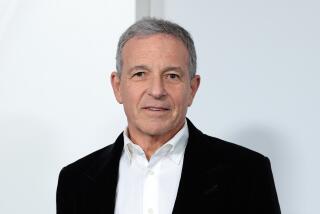Former Disney Executive Rips Saul Steinberg
- Share via
A former chief executive of Walt Disney Co. slammed a co-defendant in court Thursday, saying he had not wanted corporate raider Saul P. Steinberg “to come back and rape the company again” after the firm’s $325-million buyout in 1984 of Steinberg’s 11% stake in Disney.
The corporate raider “is motivated only by greed,” Ronald W. Miller, son-in-law of the late Walt Disney, added heatedly.
His remarks came as he explained the board of directors’ insistence on a Steinberg pledge not to buy Disney stock again. Without the condition, Miller testified, the directors would not have purchased the stake from Steinberg’s Reliance Group Holdings.
The testimony came in the fourth day of a jury trial of stockholder suits alleging that the 11-member board, the company, Steinberg and their investment advisers breached their fiduciary duty in buying Steinberg’s stake at an above-market price.
Under questioning by attorneys for both sides, Miller defended the 1984 board’s decision, saying the purchase was necessary to save the company and benefited shareholders. At one point, plaintiffs attorney William Lerach produced a deposition in which Miller had referred to the payment to Steinberg as “greenmail.”
In a full day of continued testimony in Los Angeles County Superior Court, Miller threw new light on New York negotiations between the board’s lawyers and Steinberg that worked out the buyout arrangement on the weekend of June 9 and 10 in 1984.
Apparently the decisive factor was the directors’ threat to have Disney make a tender offer for its own stock at a high price, Miller testified. Although such a step would have been “suicidal,” he said, the board never intended to carry out the move, which would have loaded the firm with as much as $2 billion of debt.
In response to questions by Lerach, Miller acknowledged that he was playing golf that weekend and did not learn of the results of the final negotiations until Monday, June 11, before the directors voted on the deal.
More to Read
The biggest entertainment stories
Get our big stories about Hollywood, film, television, music, arts, culture and more right in your inbox as soon as they publish.
You may occasionally receive promotional content from the Los Angeles Times.









